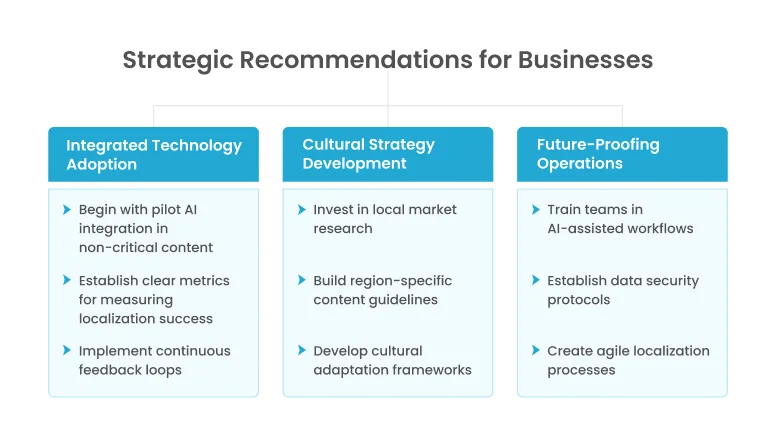As we step into 2025, the landscape of localization is undergoing a remarkable transformation. With advancements in AI, hyper-personalization, and deeper cultural understanding, businesses are better equipped than ever to connect with global audiences. But how can companies leverage these innovations while ensuring that their content remains culturally relevant and emotionally engaging?
In this article, we’ll explore the top trends shaping the future of localization and how these trends are setting businesses up for success in the ever-evolving global market.
Key Trends in Localization for 2025 & Beyond
Ready to revamp your localization strategy for 2025? Here are the top trends that will help you stand ahead of the curve and boost your global growth.
The Human-AI Collaboration
The rise of AI, particularly generative AI, has sparked concerns regarding its potential to replace human roles in the language industry. However, it has become clear that while AI tools are powerful, human expertise remains essential. AI has drastically improved translation speeds and efficiency through Neural Machine Translation (NMT), but it still falls short in addressing cultural nuances and emotional resonance. Thus, AI-Human collaboration will lead the way.
In 2025, the conversation will shift from “Is AI going to replace humans?” to “How can we integrate AI into localization workflows?” Companies that master this art will reap significant benefits. AI can handle repetitive tasks like initial translation drafts, while human linguists focus on refining translations for cultural sensitivity and contextual accuracy. This synergy will drive higher quality translations and a more streamlined process.
Hyper-Personalization
As personalization continues to dominate marketing strategies, localization is evolving to meet the demand for even more personalized experiences. In 2025, customers expect content that resonates on a deeper level—whether in their language or local customs.
Localization is no longer about simply translating content; it’s about creating an experience that speaks directly to the local audience. From localized imagery to culturally relevant examples, hyper-personalization allows businesses to build stronger emotional connections with customers. Companies prioritizing localization can expect higher engagement and better conversion rates.
Market data shows that personalized content drives higher engagement rates. Thus, it is important to localize your software, websites, and apps with special attention to personalization. At CCJK, our localization strategy incorporates:
- Region-specific consumer behavior analysis
- Local cultural calendar integration
- Demographic-based content adaptation
- Market-specific buying pattern analysis
We have what it takes to provide your global audience with a personalized, engaging experience that builds long-term relationships and boosts your business growth. Get in touch for free consultation!
Data-Driven Decision-Making
Data is becoming the backbone of most business strategies, including localization. The rise of big data provides valuable insights into customer behavior and regional trends, allowing companies to tailor their content effectively.
By 2025, data analytics will play an even bigger role in guiding localization strategies. Businesses will make real-time adjustments based on performance metrics, ensuring localized content is as effective as possible. This shift from a one-size-fits-all approach to a dynamic strategy will drive better results across markets.
Growing Importance of Cultural Intelligence
While AI and data analytics are crucial tools, they cannot replace the understanding of cultural nuances that human translators bring. Cultural intelligence is more important than ever as businesses expand into new markets.
Localization in 2025 isn’t just about language; it’s about understanding local cultures and values. For example, what works in the U.S. market may not resonate in Asia or the Middle East. Adapting content accordingly is essential for building trust with global audiences.
CCJK’s Cultural Intelligence Framework includes:
- Local festival and event integration
- Color and symbol significance analysis
- Regional buying behavior patterns
- Local market sentiment tracking
Hire Localization Experts for Global Success. Start Now!
Agile Localization
In a fast-paced world, businesses need agile localization strategies to quickly update content as market conditions change or new trends emerge.
By integrating agile workflows into their strategies, businesses can speed up their global time-to-market, ensuring their content remains relevant. Companies that fail to adopt agile practices will struggle to keep up with rapid content creation demands.
Focus on Emerging Markets
As businesses expand beyond traditional borders, localization becomes essential for entering emerging markets in Southeast Asia, Africa, Latin America, and Eastern Europe.
By 2025, localization will play a critical role in adapting content for local languages and customs in these rapidly growing regions. Whether it is for a game , mobile app or any other business, successful market entry will depend on the ability to speak the language of the people—both literally and figuratively—by addressing local consumer behaviors and understanding economic factors.
Data Security and Ethical AI
With AI tools becoming prevalent in localization workflows, concerns about data privacy and ethical practices are rising. In 2025, businesses must adhere to stricter data governance standards and ensure ethical AI use.
Prioritizing transparency in localization strategies builds trust with global audiences. Companies safeguarding sensitive information while using AI responsibly foster stronger relationships with customers.
Multimedia Localization
Video content consumption is predicted to account for 82% of all internet traffic by 2025. This surge presents both challenges and opportunities for businesses looking to expand globally.
Multimedia localization—including subtitling and dubbing—will be crucial for ensuring video content resonates with diverse audiences. Emerging technologies like real-time AI subtitling will enhance multimedia localization efforts by allowing high-quality translations at scale.
Upskilling Workforce for the AI Era
The increasing role of AI in localization drives workforce transformation. As automation takes over routine tasks, there’s a growing need for professionals to develop skills to manage these technologies effectively.
Companies will invest in upskilling teams by 2025 to ensure linguists and project managers can work alongside AI tools and make data-driven decisions. Thus, workforce development will be a top priority for localization companies.
Our analysis shows successful localization professionals now need:
- AI tool proficiency
- Data analytics capabilities
- Cultural consulting expertise
- Project automation skills

Conclusion
Looking ahead to 2025, the localization industry will be shaped by seamless integration of AI tools, human expertise, and data-driven insights. Companies focusing on hyper-personalization, agile processes, and ethical practices will be best positioned for success in an increasingly competitive global market. The key to thriving will be finding the right balance between automation and human oversight—ensuring that content is not only accurate but also emotionally resonant.
CCJK continues to innovate in this space, developing new frameworks and technologies to help businesses truly connect with global audiences. Get in touch to know more!



